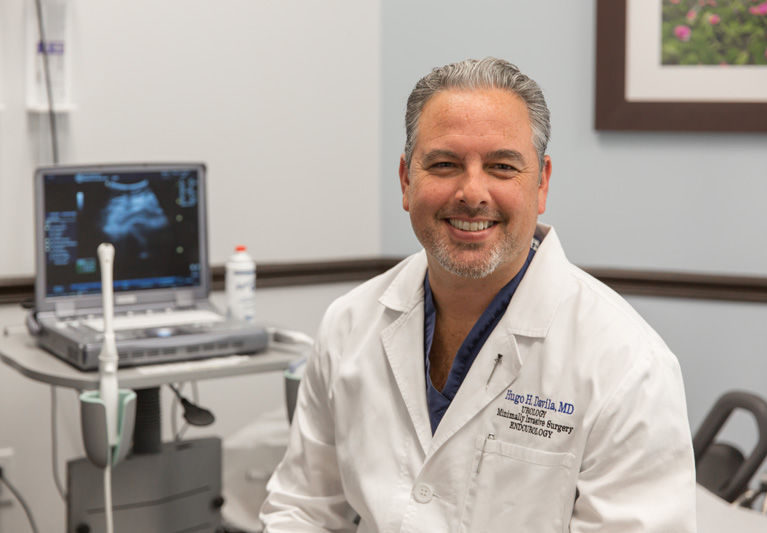
Everyone knows cranberry juice is good for urinary tract infections, right? Researchers from Texas A&M Health Science Center College of Medicine beg to differ – they concluded that while cranberry capsules are an effective treatment, cranberry juice is not.
Each year, about 3 million Americans will experience a urinary tract infection (UTI). They are much more common in women than men; some experts say that half of all women will get a UTI at some point in their lives, with many suffering from repeat infections.
Urologist Dr. Hugo Davila, MD, practices in both Vero Beach and Sebastian. He says, “More than 90 percent of UTIs are caused by E. coli getting into the urinary tract through the urethra, and then multiplying in the bladder. The female anatomy puts women at a higher risk than men for UTIs.” The urinary system is designed to keep out these invaders, but if its defenses fail, a full-blown urinary tract infection can develop. Antibiotics clear up UTIs quite nicely, but it’s even better if the infection can be prevented in the first place.
Enter the cranberry plant – a low-growing, woody, vining perennial responsible for producing over a billion pounds of tart fruit each year. Cranberries help with both the prevention and treatment of UTIs because they contain A-type proanthocyanidins, which interfere with the ability of bacteria to adhere to the bladder wall. As a preventative measure, the recommended daily dose of cranberry capsules is 300-400 milligrams.
Study leader Dr. Timothy Boone, Ph.D., explains why cranberry juice does not work: “It takes an extremely large concentration of cranberry to prevent bacterial adhesion. This amount of concentration is not found in the juices we drink. There’s a possibility it was stronger back in our grandparents’ day, but definitely not in modern times.”
Vero’s Dr. Davila told us about a report from the University of Michigan; it concluded that cranberry juice may not be well-tolerated long term, another reason to use capsules rather than juice.
The team from Texas A&M studied 160 patients who underwent elective gynecological surgery. Because of the insertion (and removal) of a catheter, the development of a UTI is common following this type of surgery. Half of the women took four cranberry capsules each day for 6 weeks after surgery; the other women took a placebo. In the cranberry treatment group, 19 percent of the women developed a UTI, compared with 38 percent of the placebo group; so the capsules cut UTI incidence by 50 percent.
UTIs are perhaps one of the most self-diagnosed of medical conditions; its symptoms are immediately recognizable by sufferers: frequent and painful urination, pelvic and lower abdomen pain, traces of blood in the urine, and fever.
Natural remedies have a strong appeal, especially because the overuse of antibiotics can lead to UTIs and other bacterial infections becoming drug-resistant. In addition to cranberry capsules, there is some evidence that probiotics, especially of the lactobacillus variety, can be a safe alternative to antibiotics in the treatment of UTIs. Lactobacillus is the “friendly” bacteria that live in our digestive tract; it can be found in dietary supplements, yogurt, a fermented milk drink called kefir, and soy products.
Dr. Davila says the reason probiotics can help in both the treatment and prevention of UTIs is that they decrease the concentration of E. coli in the urinary tract. He says, “We always like to start with approaches that have no side effects. Probiotics fall into that category, as do cranberry capsules.”
For post-menopausal women who suffer from recurrent UTIs, vaginal estrogen is sometimes prescribed as a preventive measure; like probiotics, it works by reducing E. coli levels. Even though all drugs can have side effects, the risk is generally minimal when a low dose is used.
It’s important that people with a self-diagnosed and self-treated UTI still seek medical advice, to make sure more aggressive treatment isn’t needed; there is a danger of UTIs developing into a more serious kidney infection.
Dr. Davila can be reached at Florida Cancer Specialists. The Vero office is located at 1880 37th St.; the phone number is 772-567-2332. The Sebastian location is 13060 US Highway 1, Suite A; the phone number is 772-589-0879. The website for Florida Cancer Specialists is www.flcancer.com.



